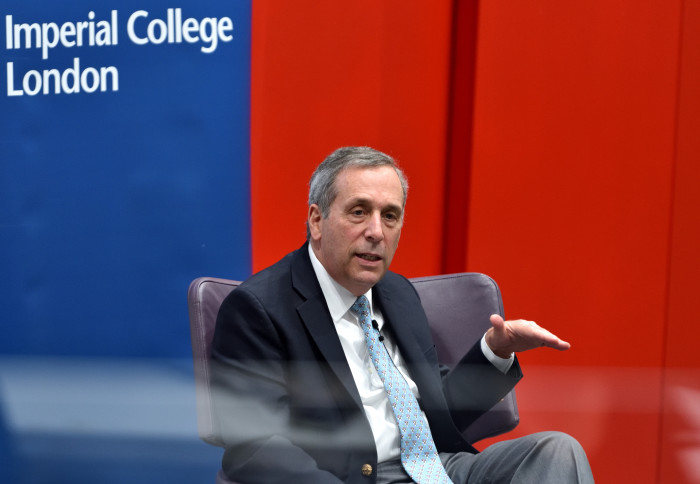Harvard President on Ukraine, climate threat and diversity in education

President Lawrence Bacow spoke at Imperial this week about the war in Ukraine, the global threat of climate change and widening participation.
The war in Ukraine
President Bacow addressed the war in Ukraine and spoke about the role that universities can play during conflicts.
"Personal relationships are important and scholarly relationships are important to maintain even during times of tension.” Lawrence Bacow President of Harvard
President Bacow said: "What we can do is shine a spotlight on this conflict, bring to bear the collected scholarship of faculty who have been studying this region for years and help informed debate about what kind of policies might be reasonable for governments to pursue.
"We can show solidarity with the Ukrainian people and we can support our people, students, faculty, staff from Ukraine and Russia."
On the importance of internationalism for universities President Bacow added: “Institutions like ours influence the world largely though our teaching and scholarship. It’s important to maintain scholarly connections - there are things that our universities can do that our governments may find hard or challenging to do. Personal relationships are important and scholarly relationships are important to maintain even during times of tension.”
In a message to all staff and students, President Alice Gast and Provost Ian Walmsley outlined how Imperial's community is showing solidarity with Ukraine.
Climate change

Climate change is an area of research that is central to both Harvard and Imperial. President Bacow said: “Climate is the existential threat we face as a planet.
"The vast majority of science is settled in terms of climate, the really big question that we face as a planet is either a philosophical or ethical question; that is the responsibility of our generation to future generations.
"The cost of climate change will be born by the poorest in the world, wherever they may be. That imposes responsibilities on wealthy countries like ours, and institutions like ours." Lawrence Bacow President of Harvard
"What kind of costs are we willing to incur so that those coming after us can enjoy a life as good as the one we’ve experienced?
"The cost of climate change will be born by the poorest in the world, wherever they may be. That imposes responsibilities on wealthy countries like ours, and institutions like ours.
"This is a problem that will not be solved by scholarship alone, we need to engage with industry and parts of industry whose behaviour needs to change the most.
"We need to think about ways in which we can work cross institutions so people can see a future for them that’s better than the present."
Imperial’s Transition to Zero Pollution is a pioneering programme in research, education and innovation to address the entire system and life cycle of pollution.
Diversity in education

President Bacow, who was raised by immigrant parents, also spoke about why diversity of students and staff is so important to Harvard and other institutions.
"Talent is distributed flatly, but opportunity is not.” Lawrence Bacow President of Harvard
President Bacow said: “We believe in diversity to learn from our differences, any institution would be really dull if everyone came from the same background and wanted to pursue same thing and thought the same way about every issue.
“We can never hope to achieve as much by sampling from a fraction of the talent that’s available to us as sampling by all of it. Talent is distributed flatly, but opportunity is not.”
Last year Imperial announced a new set of scholarships for Black-heritage students.
The future of universities
President Bacow also spoke about the the future of universities as the world emerges from the pandemic.
President Bacow said: “We’re going through a period of accelerating change. Technology has made information more widely available.
"I'm optimistic we will build back better from Covid, we’ve always found a way to build back better.
"I believe in the capacity of people to seize the moment and address the grand challenges of the world."
Imperial's President Gast wrote for the World Economic Forum earlier this year about the ways that universities can future proof education.
Imperial and Harvard

Imperial and Harvard University have collaborated together for decades. Academics from both institutions are working together to carry out ground-breaking research into many scientific areas such as infectious disease.
Harvard is Imperial's top partner in the US in terms of co-publications, with 2,483 co-authored publications between 2016-2021.
Scientists from Imperial and Harvard have also created the world’s largest publicly available database of genetic variants – changes in DNA that can sometimes lead to disease.
Article text (excluding photos or graphics) © Imperial College London.
Photos and graphics subject to third party copyright used with permission or © Imperial College London.
Reporter
Stephen Johns
Communications Division